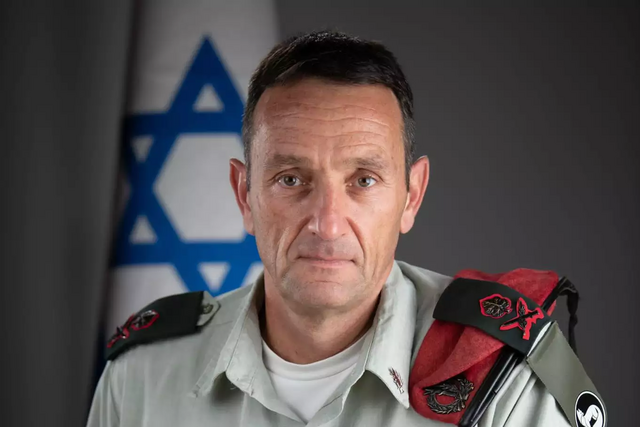Israel's military chief, Lt. Gen. Herzi Halevi, declared Monday that his country will respond to Iran's weekend missile and drone attack, but refrained from providing details on the timing and nature of the retaliation. The statement comes amidst growing international pressure on Israel to exercise restraint and avoid further escalation in the Middle East.
The Iranian attack on Saturday, which targeted Israel's strategic capabilities, marked the first time Iran has launched a direct military assault on the Jewish state despite decades of hostility dating back to the 1979 Islamic Revolution. According to the Israeli military, Iran launched hundreds of drones, ballistic missiles, and cruise missiles, with 99% of them intercepted by Israel's air defenses and warplanes in coordination with a U.S.-led coalition of partners.
Speaking from the Nevatim air base in southern Israel, which suffered minor damage in the Iranian attack, Halevi stated, "Iran wanted to harm the strategic capabilities of the State of Israel - that is something that had not happened before. We were prepared for the 'Iron Shield' operation - preparation that brought Iran to also meet air superiority." He added, "We are looking ahead, we are considering our steps, and this launch of so many missiles, cruise missiles, and UAVs into the territory of the State of Israel will be met with a response."
Prime Minister Benjamin Netanyahu has been meeting with top officials to discuss a possible response, but the government has made no announcements on any decisions for a second straight day. In a conversation with U.S. House Majority Leader Steve Scalise, Netanyahu emphasized that "Israel will do whatever is required to defend itself."
Despite hints at retaliation from Israeli leaders, the government is under heavy international pressure to refrain from further escalating the conflict, especially given the minimal damage caused by the Iranian strike. The U.S. has urged Israel to show restraint as it seeks to build a broad diplomatic response, with the Group of Seven advanced democracies issuing a joint statement condemning the Iranian attack and expressing solidarity with Israel.
The U.S. has also been working to strengthen ties between Israel and moderate Arab states in an alliance to counter Iran, with much of the cooperation taking place under the umbrella of the U.S. Central Command (Centcom). The Iranian weapons flew through Saudi skies, according to a map released by the Israeli military, indicating at least tacit cooperation with the Saudis in intercepting the missiles and drones.
However, a unilateral Israeli strike could strain these behind-the-scenes contacts, particularly with countries like Saudi Arabia that do not have official diplomatic relations with Israel. It also risks opening a new front with Iran at a time when Israel is embroiled in a six-month war against Hamas militants in Gaza, which has claimed the lives of over 33,700 Palestinians and caused widespread devastation.
World leaders, including British Prime Minister Rishi Sunak and French President Emmanuel Macron, have pressed Israel not to strike Iran, urging restraint to avoid a rising spiral of violence in the region. U.S. Secretary of State Antony Blinken pledged to step up diplomatic efforts against Iran while supporting Israel's security, stating, "Strength and wisdom need to be different sides of the same coin."






